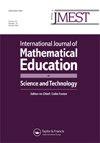七年级学生对数学建模活动带来的风险和回报的理解*
IF 0.6
Q3 EDUCATION & EDUCATIONAL RESEARCH
International Journal of Mathematical Education in Science and Technology
Pub Date : 2023-10-11
DOI:10.1080/0020739x.2023.2258881
引用次数: 0
摘要
摘要本研究通过两个数学建模任务,考察了七年级学生在风险和回报背景下的新兴和渐进式金融素养。参与者是六名被老师评为“数学好”的七年级学生。数据来源包括录像小组讨论,小组报告,工作表和研究人员的现场笔记。结果表明,学生的金融经验和数学知识影响了风险和回报情境下的数学建模过程。有金融背景经验的学生,与建模任务中的学生相似,在做出金融评论和将数学知识联系起来方面更成功。我们的结论是,数学建模任务将鼓励学生讨论和采用不同的方法,促进更先进的金融思维。讨论了数学建模活动如何在风险和回报的背景下激活学生的金融知识,并提出了进一步研究的局限性和建议。关键词:金融素养;数学模型;中学生;风险与回报;本文章由计算机程序翻译,如有差异,请以英文原文为准。
Seventh-grade students’ understanding of risk and reward arising from mathematical modelling activities*
AbstractThis study examined seventh-grade students’ emergent and progressive financial literacy in the context of risk and reward while working on two mathematical modelling tasks. The participants were six seventh-grade students identified as ‘good at mathematics’ by their teachers. The data sources comprised videotaped group discussions, group presentations, worksheets, and researchers’ field notes. The results revealed that students’ financial experience and mathematical knowledge influenced the mathematical modelling process in the context of risk and reward. Students with experience in financial contexts, similar to those in the modelling tasks, were more successful in making financial comments and linking mathematical knowledge. We conclude that mathematical modelling tasks would have encouraged students to discuss and adopt different approaches that facilitated more advanced financial thinking. How mathematical modelling activities might activate students’ financial knowledge in the context of risk and reward was discussed, and limitations and recommendations for further research are included.KEYWORDS: Financial literacymathematical modellingmiddle schoolrisk and reward Disclosure statementNo potential conflict of interest was reported by the authors.
求助全文
通过发布文献求助,成功后即可免费获取论文全文。
去求助
来源期刊

International Journal of Mathematical Education in Science and Technology
EDUCATION & EDUCATIONAL RESEARCH-
CiteScore
3.30
自引率
11.10%
发文量
123
期刊介绍:
Mathematics is pervading every study and technique in our modern world, bringing ever more sharply into focus the responsibilities laid upon those whose task it is to teach it. Most prominent among these is the difficulty of presenting an interdisciplinary approach so that one professional group may benefit from the experience of others. The International Journal of Mathematical Education in Science and Technology provides a medium by which a wide range of experience in mathematical education can be presented, assimilated and eventually adapted to everyday needs in schools, colleges, polytechnics, universities, industry and commerce. Contributions will be welcomed from lecturers, teachers and users of mathematics at all levels on the contents of syllabuses and methods of presentation.
 求助内容:
求助内容: 应助结果提醒方式:
应助结果提醒方式:


